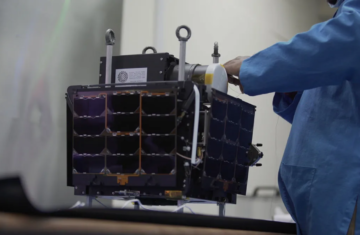India’s inaugural private rocket, launched on Friday, successfully breached the edge of space before descending into the Bay of Bengal, marking a significant milestone in the entry of the private sector into the country’s space endeavors. The 6-meter tall Vikram S suborbital vehicle, developed by the four-year-old startup Skyroot Aerospace, reached an altitude of 89.5 km approximately 2.5 minutes after launch from the Indian Space Research Organisation’s (ISRO) sounding rocket facility at Sriharikota.
The rocket aimed to reach space, starting at an altitude of around 80 km, and attempted to touch the Karman Line at the 100-km altitude mark—the boundary where Earth’s atmosphere ends but satellites cannot maintain a stable orbit. Most commercial flights typically operate at around 10 km altitude. Named “Prarambh,” the mission validated subsystems for Skyroot Aerospace’s upcoming Vikram-1 orbital flight scheduled for the next year.

The mission, deemed successful even at an altitude of 50 km, carried three non-deployable customer payloads, including SpaceKidz India’s FunSat. These payloads included sensors and instruments to validate flight-worthiness and payload integration processes for Vikram-S.
Pawan Chandna, Mission Director, and Co-founder of Skyroot Aerospace stated, “This is a small step by a startup and a giant leap for the Indian Space Industry. It’s the Prarambh of a great future.” The launch demonstrated the potential for private entities in India’s space sector, with more than 100 startups collaborating with ISRO across various domains.

The Vikram S vehicle, though a test run, holds significance as it paves the way for the launch of a larger vehicle by Skyroot Aerospace next year. Prime Minister Narendra Modi hailed the event as a historic moment, marking an important milestone in India’s private space industry. Skyroot Aerospace is developing a series of rockets, all named after Vikram Sarabhai, the pioneer of the Indian space program.
The successful launch indicates the growing involvement of private players in India’s space economy. Lt. Gen. AK Bhatt, Director General, Indian Space Association (ISpA), stated that India’s space economy is projected to grow to $13 billion, with the space launch segment expected to have the fastest growth by 2025. The launch signifies a major landmark in this growth, fueled by private participation, technological advancements, and cost-effective launch services.



